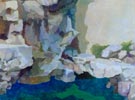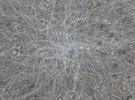Freschini: Recently, during your staying in Italy we had a small talk about the situation in Italy, where religion is still very present and powerful, this brings you to some reflections and considerations. You told me that this experience make you understand more and better lots or things, not just concerning Italy and its religious behavior but also about your believes and notions about Buddhism….
Zhang: Let’s discuss this as it relates to the “perspective of the outsider.” I look at Italy from the outsider’s perspective. When I was in Italy, I visited the Illy Coffee Factory, a winery and a clock factory. They placed great importance on the preservation of traditional craftsmanship. In addition, I spent a great deal of time at some less-developed small towns visiting archaeological sites, ruins and churches. They all implied certain historical and cultural information. The humanist sentiment reflected in these historical sites surpassed my preconceived impressions of Italy – my impressions of those fashion capitals of Rome and Milan. The survival of these sites has allowed people to gain an everyday, microscopic understanding of ancient urban culture. The material development of Chinese society today is closing the gap with the West. They are already very close, but this is just a reflection of the material level. The real gap is embodied in the spiritual and cultural character of the people, as well as the social system. Art is an important channel for observing society and people.
The exhibition will take place this September. I am planning to approach it from a comparison between Catholicism and Chinese Buddhism. For the opening of the new Sakya animated film, I used a mudra. Some people might not understand this use of a mudra in the opening. They may think that the hand positions are sign language, without realizing how much indescribable meaning is found within them. At the upcoming group exhibition I will project mudras into the space of a church. It will be a dialogue about religion. Mudras represent the spiritual world of Buddhism, while the church space is full of solemnity and grandeur. The two of them will engage in a dialogue and meditation on the different religions. I hope I can take both the Chinese and Italian perspectives, and through them find a different point of entry. Art can traverse history and reality. The religious connections I focus on are a perspective. It’s not really such a grand one, just a reading of the individualization of religion, but I hope it can become a fresh look and gaze at different historical dimensions. For every film I make, I engage in close observations and thinking about all of the footage, and then extract from this analyzed footage. The thought and practice processes are very important to me.
I’ve discovered that religious life is a part of everyday life in Italy. We went to Bolzano in northern Italy, which is situated on the border between Italy, Switzerland and Austria [not Germany note: actually Bolzano borders with Switzerland and Austria no Germany.] The people there are German-speaking Italians and the churches are built in the Gothic style. There is a clear sense of cultural hybridization. Churches are carriers for the architecture, culture and arts of different historical periods. The religious life is in a tranquil state within Italian society. The churches, cemeteries and museums form a “soul” of the nation.
Freschini: Did you find any connection between the Roman Catholic Church and Buddhism?
Zhang: Ancient Chinese people called “heaven” the “old man of heaven”. “Heaven” in this sense is a superior deity who meted out justice. When Catholic missionaries brought Catholicism to China in the late Ming dynasty, in order to set their god apart from the gods of traditional Chinese religion, they drew from the Confucian statement of “nothing is higher than heaven, nothing more respected than the lord” to call their god “lord of heaven” (Tianzhu), to be the “true lord of heaven and earth, the lord of man and of all things,” and named their religion “the religion of the lord of heaven” (Tianzhu Jiao). Catholicism emphasizes its universality, and calls itself a public religion. This refers to Catholicism’s permeation of western European society’s politics, economics, morality, law, academics, culture, education, art and every other field during the Middle Ages, becoming an omnipresent spiritual force.
Buddhism, also known as the teachings of the Buddha, is the full, diverse cultural and social education as taught by the Sakyamuni Buddha with regards to all realms of life. In terms of time, it covers the past, present and future. In terms of space, it begins with the life we can see, and extends out into infinite worlds. It does not make distinctions for nations, ethnic groups or religions, and it covers the limitless dimensions of space. Why is Buddhism not a religion? In a religion, god and the people have a master/servant, father/son relationship. God created all things, and the people can never become god.
“Buddha” means all of the Buddhas. It is an inclusive term. A “Buddha” is a personage that has reached the highest levels of wisdom, emotion and abilities. Simply put, a Buddha is an “enlightened one.” The term “enlightened one” was transliterated into Chinese from Sanskrit as “futu” or “fotuo,” and the Chinese term for “Buddha” is a shortened version, “Fo.” To put it in perhaps clearer terms, a Buddha is someone who has penetrating insight into the fundamental principles of the universe and life. Since Buddhism spread into China in the Han dynasty, it has come to have a profound impact on Chinese culture, especially through the localized Zen Buddhism, which was spread by the Six Patrons. Zen Buddhism states that all people have Buddha nature in their minds, and that to become a Buddha, one must see his own nature. After the Six Patrons, Buddhism spread far and wide, flourishing in the late Tang dynasty and the Five Dyansties period. Zen brought Chinese Buddhism to the peak of its development and had a great impact over the development of ancient Chinese culture.
There is a lot of similarity between the concepts of “heaven and hell” and of “patience and submission” in Catholicism and the “cycle of karma” in Buddhism. Buddhism places more emphasis on wisdom and personal cultivation, while Catholicism focuses on such universal values as fairness, freedom, love and justice. This is the nucleus of European civilization’s advancement in recent times.
Freschini: As you know, the Catholic Church’s state is placed inside the Italian territory, the Vatican do have lots of power and political importance in the internal affairs… from my point of view… shouldn’t be like this, as Confucius said “己所不欲 勿施于人”… religious matter must be something that belong to the person, something very intimate, private and subordinated to the authority, can be not be linked to external political or economical situations, this misunderstanding is the real reason of lots of social problem in the world. Fortunately, China always took this two different matter apart, isn’t? The government never really use or make any closed connection with any dogmas...do you think that this situation provokes a lack of spirituality in China?
Zhang: The fusion of politics and religion disappeared in China long ago. Today, many temples in China are highly commercialized and secularized. It pains many of us to see this. Some temples don’t even have monks anymore, only property managers who collect entry fees and donations from believers. This is a horrible situation. There’s no basic morality anymore. The temple is a sacred place for the spirit. The result of overdevelopment is devastating destruction.
After the Yushu earthquake in Qinghai province, many monks came out to the scene of the cremations to bless the spirits of the dead. It was a very moving scene. The Tibetan people are very tranquil. They don’t cry and wail in the face of death like the Han people. I went to the ruins of the Sichuan earthquake, and I found many shocking contrasts, but overall, there is quite a difference between having faith and not having faith. The transcendent views about love, life and death in traditional civilization are very important. We are so far from the lofty heights of tradition. Our crazed construction has cut and destroyed this thread, and we don’t know if our traditions will end up in books or in other memories. The break in traditional culture and the loss of faith form the direst predicament we face today, and will require a long time to remedy.
Freschini: In this last few years, in China, the religions have marked a fast constant development: the numbers of believers has increased significantly, and everywhere new churches, temples and mosques have been building up… I heard about 300 hundreds new churches… what means this to you? Seems people is looking for something...
Zhang: Religion is free in today’s China, but China’s modernization transition has been too drastic, and traditional values have almost completely collapsed in this fully market and commerce-oriented era. This is a massive problem. A lot of temples today are highly commercialized, run only to collect entry fees and incense sales, and most believers pray as a kind of exchange. From the perspective of religious faith, this is very pessimistic. In a drastically transforming society, people have a pressing need for religion to repair their souls. The Han people are focused on this life, which is a result of history. Society is changing too rapidly, so serious problems have emerged in people’s minds and bodies. This has much to do with the collapse of traditional values, morals and beliefs. The rise of the material has brought more unhappiness. We need a profound rethinking. Excess commercialization and materialism bring disastrous results. The problems are especially serious in education. So many serious problems are emerging in China today, and at its root, this is a human problem. For instance, during the First Sino-Japanese War, the Qing Navy used ships built by the Germans, but they lost out to the Japanese, who almost destroyed their entire army. Why was this? The deciding factor in this war was the people, not the weapons. We are in an era of total collapse of morals, ethics, traditions and faith. This is the most tragic thing about today. As an artist, I truly feel powerless and pessimistic. I think that it’s mainly a psychological problem. We need to ponder, rethink, criticize and engage in self-searching and construction. Why are Chinese people unhappy today? It is connected to the collapse of traditions, values and faith. We really live in a mirage of the material, a beautiful illusion, and our spirits are in the wilderness. The reconstruction of morals and faith-based values is an important remedy for society. The power of culture and religion stretches out through the ages, never dying. I believe in the restorative powers of religion. We have destroyed too many cultural roots, cut off our connection to classical civilization. The future is built on the foundation of the past and the present.




